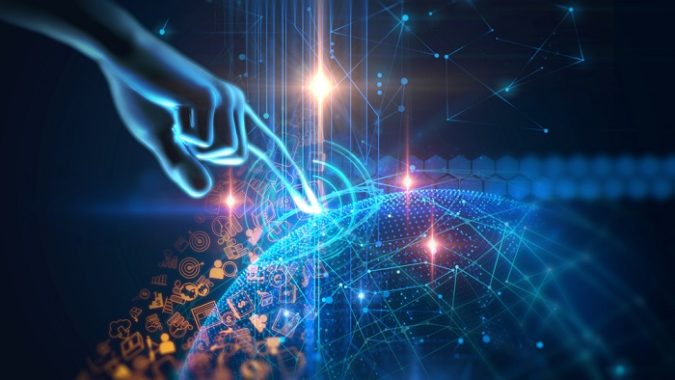Despite transitional growing pains, the promise of artificial intelligence (AI) in innovation and decision-making offers a future with better decisions made at the command of but not by humans. That’s what Pradeep Dubey, director of the Parallel Computing Laboratory at Intel, told attendees of a plenary talk at the PEARC18 conference in Pittsburgh, Pa., on July 25.
“Humans and machines have had this very nice separation of labor,” Dubey said. “Humans make decisions; machines crunch numbers … but humans are terrible decision makers.”

The annual Practice and Experience in Advanced Research Computing (PEARC) conference—with the theme Seamless Creativity—stresses key objectives for those who manage, develop and use advanced research computing throughout the U.S. and the world. This year’s program offered tutorials, plenary and contributed talks, workshops, panels, poster sessions and a visualization showcase.
The upending of the current hierarchy of decision making—and the division of labor—between brains and computers represented by progress in AI research has been controversial among the general public. But perhaps it shouldn’t be, Dubey argued.
“Most errors in medicine are human errors; most accidents in driving are human errors,” he said. “Humans [have] had this job for way too long.”
Dubey argued that the power of deep learning offers a future in which answers are “reverse engineered” from the data rather than being generated by hypothesis testing of data—essentially taking humans out of the analytical loop.
“We can learn via brute force from the data,” he said. “We don’t need to wait on a Newton born once every 100 years.”
Today, Dubey said, the AI field has begun succeeding at task-specific learning—a deep-learning model can create an algorithm that addresses a particular problem encompassed by a learning dataset. But it can’t generalize to other problems, and it can’t adapt autonomously as a human can. One limitation is posed by training data—slight mismatches between the data used to optimize the algorithm and the real world can generate large errors in output. Applying an algorithm from a particular problem even to a closely related but different problem only increases that mismatch.
“How do you generalize from there?” he said. “That’s the next Holy Grail.”
Dubey reviewed Intel Labs’ work on neuroscience, scalable algorithms for learning and decision-making, and the development of an end-to-end pipeline from data to developing solutions for new problems.
Pervasive model deployment, in which feedback continually re-trains the algorithm, is a major focus. So is computing architecture, including using quantum computing that could allow better scaling than possible with the classic von Neumann architecture.
In theory, Dubey said, “we should be able to encode [deep learning] in a quantum machine in a single shot,” with all the layers of the learning process superimposed on one quantum waveform. The fundamental problem, he argued, is that quantum phenomena are linear phenomena, while the layers in a deep-learning network are connected by nonlinear relationships. “Otherwise, it could collapse into one layer.”
Another focus at Intel, he said, is to “hack the chip” of the brain using fMRI brain scans. Yet another is to derive physical constants direct from the data rather than from the classical hypothesis/experimentation loop. At the SC18 HPC conference in Dallas in November, he added, Intel Labs researchers will present the derivation of cosmological constants direct from simulations—including a measure of the curvature of the Universe five times more precise than those derived from scientific testing.
One very difficult problem for AI will be code generation, also being studied at Intel—“using AI for AI development.” AIs are attractive in this sphere because AI systems working from different standards or conventions wouldn’t need to be told about it—their algorithms would adjust.
Ken Chiacchia is a Senior Science Writer with the Pittsburgh Supercomputing Center.





























































